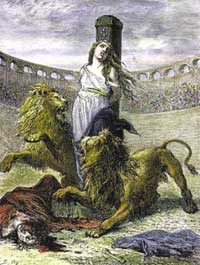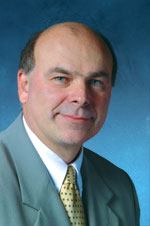The Dinosaur of Fundamentalism
Lincoln E. Steed January/February 2008
Getting your Trinity Audio player ready...

A few days ago I went with my two children on a school outing to the Science Museum at the Baltimore Inner Harbor. Kids love science—or at least the apparent mystery that goes along with the topic. For example, the spinning wheel with black dashes on a white face that appears to be two other colors when spun clockwise, and two entirely different colors when spun anticlockwise. Christopher and Kristen were literally wide-eyed with wonder at that one. The museum guide explained part of the principle of cone receptors in the eyes; and concluded by admitting there is no explanation for the directional color shift (letters please!). That's science. Always in pursuit of knowledge.
As anyone who knows children would expect, mine spent most of their time in the dinosaur exhibit. It was hard to ignore, with its full-sized models of Tyrannosaurus Rex and the other huge long necked one that ate grass and was eaten by T-Rex! I tried listening to my i-Pod at one point, and found that the ever-present dinosaur sounds neatly overpowered it with pipe organ overtones. I was forced to pay attention to the exhibit, and watch my children as they brushed away soil to uncover fossilized bones, sat in plaster cast imprint holes of dino footprints, and handled dinosaur eggs in nest like patterns.

About then I fell into conversation with one of the museum guides.
She noted how the exhibit is easily the most popular part of the museum. I remarked with some intended irony how there is such extensive knowledge of dinosaurs—even of color, nests and sounds, etc. She rose to the bait nicely.
"Yes," she said, " it is pretty overwhelming. But do you know we get people in here who refuse to believe it. Who only believe in creation." She hunted my eyes for a flicker of agreement. "Still it's good to know what the opposition is thinking." Time for me to respond.
"Well," I answered, " it is pretty certain that these things existed sometime. But I do believe in the Bible and creation. Maybe sometimes faith is needed to accept any view we take." I was thinking of the leaps of faith required to take bones turned to stone and present them as fleshed out, social creatures one can hear and empathize with. Unfortunately I may have revealed myself as the enemy. I did so want to discuss why there need not automatically be a presumed break between faith and reason. I had even hoped to discuss what God might have meant by "leviathan" in His dialog with Job.
"Them" and "us" has always been a poor way to discuss faith and reason. As though they are two distinct things. History shows otherwise, of course.
Right now we are in a global conflict, as some have put it, between progressive, rational modernity and religious fundamentalism. (Read the article "Religious Freedom or Religious Fundamentalism" on page 18.) Fear of terrorism has made it an "either with us or against us" scenario. But if you pause for a minute and think rationally on it, things are not quite that simple.
I get a lot of letters. Some you see in the letters column each issue. Others I answer privately. Some of course get easily filed. Others trouble me.
Got a letter the other day from Malcolm Dillard, on the city council of Dillard, Georgia. He wants to cancel Liberty "Because I do not share any of its views in regards to separation of church and state." Shot across the bow, obviously. It is true Liberty has always been jealous to keep the separation of church and state operative—it's constutional, it's biblical and it's historically arguable as protective of both church and state.
Mr. Dillard stated correctly that "Our government is not trying to force religion on anyone." And somewhat incorrectly that "Our nation was founded on Christian principles." He then blamed the chipping away of the rights of Christians on "organizations like yours." That hurts. That had better not be true.
To be historically candid, I would be personally more reassured if I could equate the founding of America with a Christian intent. It's not to be found in any of the issues that led to the war with England. It might be deduced from the general Protestantism of the population; although I find an unfortunate Masonic theme to be more intrusive than a Christian one. What is certain is that the framers and their society intended to protect the faith baby in the bathwater of their society.
Continuing, Mr. Dillard writes that "God is just and will judge our nation if we continue this downward path." Well, yes, I agree with that wholeheartedly. But what has caused our downward path? Has government mandate ever shown an ability to create true faith? To be sure those states of the Middle Ages that came under church control tried mightily to force their citizens to obey church dicta, and punished those who resisted. And even today in America we have the shadowy "Blue Laws" still lurking on the statute books as a reminder of how hard died that medieval mentality. What Mr. Dillard seems not to notice in our current model is the willingness of religious leaders to take control of political power and use it to advance their cause. To this the Constitution says a big No. This is the way of the fundamentalism that we decry worldwide.
I signed off on our fundamentalist article already alluded to. Author Bert Beach makes many good points. What needs clarifying is the term "fundamentalist" itself. Today it has become a proxy for an array of religious behaviors we find either ridiculous or dangerous.
Islamic fundamentalism holds that religion and religious forces should control the state. Afghan Taliban and Iranian Mullah rule have shown the world an actual repression of individual faith. Violent Islamic fundamentalism is self righteous enough to want to kill everyone to save the village. Both in the Islamic and Christian worlds there are nativist religious groups who would trample on others beliefs to ensure that theirs are dominant. And coloring our view of such negative religiosity is the fact that in traditional cultures it is the under-educated masses that most support the predominant faith. Their retrograde worldview has become shorthand for describing "fundamentalism."
We risk forgetting the origin of the term, and the opprobrium once accorded it.
At the dawning of Christianity, to profess faith in Jesus put one at odds with society's norms and under the scrutiny of a state that suspected a Christian of disloyalty. A Christian had to be convicted of the "fundamentals" of faith. These had to be identified and were worth dying for—as many early Christians did. What a great irony that today those who kill for faith are confused with the great fundamentalists through the ages: heroes and martyrs who were inflexible on the vital matters of faith. The ones who led national revivals, started religious reformations and prepared the spiritual soil in a new land for a republic that respected faith.


Lincoln E. Steed
Editor,
Liberty Magazine
Article Author: Lincoln E. Steed
Lincoln E. Steed is the editor of Liberty magazine, a 200,000 circulation religious liberty journal which is distributed to political leaders, judiciary, lawyers and other thought leaders in North America. He is additionally the host of the weekly 3ABN television show "The Liberty Insider," and the radio program "Lifequest Liberty."